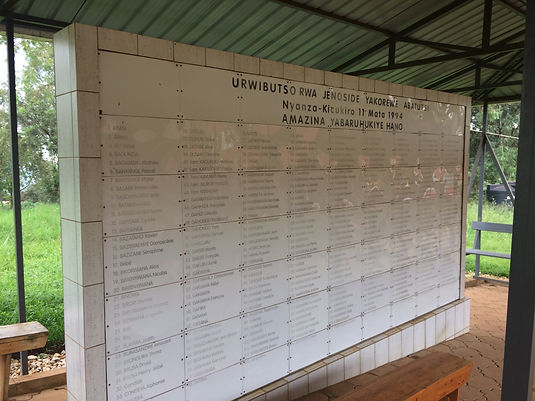After Genocide: Memory and Reconciliation in Rwanda
University of Wisconsin Press, Critical Human Rights Series

In the wake of unthinkable atrocities, it is reasonable to ask how any population can move on from the experience of genocide. Simply remembering the past can, in the shadow of mass death, be retraumatizing. So how can such momentous events be memorialized in a way that is productive and even healing for survivors? Genocide memorials tell a story about the past, preserve evidence of the violence that occurred, and provide emotional support to survivors. In After Genocide, I investigate the ways memorials can shape the experiences of survivors decades after the mass violence has ended.

*Winner of the American Society for Criminologists, Division of Feminist Criminology, Outstanding Book Award.
* Winner of the American Sociological Association, Section on Peace, War, and Social Conflict, Outstanding Book Award Honorable Mention.

Praise for After Genocide:
--
"After Genocide has several merits... the book provides important insights into the conditions for memorialization. Fox argues for careful consideration of commemorative and memorial policies to ensure that such decisions are not only respectful and appropriate, but also address the varying needs and views of the communities concerned. While there is exhaustive literature on collective memory, conditions for memorialization remain an under-researched area. The volume is therefore a useful addition to this end...this well-researched volume draws on a wealth of ethnographic data collected over 9 years with 72 survivors-- Philip Onguny Saint Paul University, Review in Peace & Change
"Offering rich insights and original thinking based on voluminous primary research, Fox's book is to be highly commended for addressing a critical area on contemporary Rwanda. For any reader concerned either specifically with Rwanda’s post-genocide recovery or the process of reconciliation and memory following mass atrocities in general, After Genocide is an exceptionally worthwhile read." Phillip Cantrell Longwood University H-Net Genocide
“Powerful. Fox’s findings—including that the more mundane, everyday interactions are a more meaningful component of reconciliation—make beautiful and important contributions to the literature on peacebuilding and transitional justice, and have critical implications for international actors and policymakers.”—Marie E. Berry, author of War, Women, and Power: From Violence to Mobilization in Rwanda and Bosnia-Herzegovina
“After Genocide is a must-read for criminologists, cultural sociologists, and transitional justice scholars. Engaging and innovative, it entails crucial lessons on conditions of memorialization—its intensity, selectivity, and gendered nature—and its effects on peace.”— Joachim Savelsberg, University of Minnesota
“Essential for anyone interested in collective memory, violence, and social justice. Fox’s careful, in-depth fieldwork results in a rich understanding of how Rwandans remember and narrate their pasts, and her brilliant concept of stratified collective memory powerfully illustrates how some peoples’ memories become privileged while others’ memories are marginalized.”—Hollie Nyseth Brehm, The Ohio State University
Welcome visitors to your site with a short, engaging introduction.
Double click to edit and add your own text.
Listen to After Genocide
on Recent Podcasts
“Memorials, Transitional Justice, and The Inescapability of Memory.” August 2, 2023. Madison Book Beat. Madison Community Radio. https://www.wortfm.org/scholar-nicole-fox-on-memorials-transitional-justice-and-the-inescapability-of-memory/.
“After Genocide: Memory and Reconciliation in Rwanda.” July 5, 2023. Johannesburg Holocaust and Genocide Podcast. South Africa. https://soundcloud.com/user-858426360/jhgc-in-conversation-with-dr-nicole-fox?utm_source=clipboard&utm_medium=text&utm_campaign=social_sharing
“Memory and Reconciliation in Rwanda.” June 23, 2023. Peace and Justice. People Powered Radio. https://www.kzfr.org/broadcasts/34250.
“After Genocide: Memory and Reconciliation in Rwanda.” April 22, 2022. Historical Dialogues, Columbia University. https://historicaldialogues.org/historical-dialogues-justice-and-memory-network-seminars/
“After Genocide: Memory and Reconciliation in Rwanda.” March 28, 2022. Center on Race, Immigration and Social Justice Podcast. https://open.spotify.com/episode/4T6kK7GhrpwoawxZ0JuU7G.
“After Genocide: Memory and Reconciliation in Rwanda.” December 17, 2021. New Books Podcast. https://podcasts.apple.com/us/podcast/nicole-fox-after-genocide-memory-and-reconciliation/id615387910?i=1000546313489.

